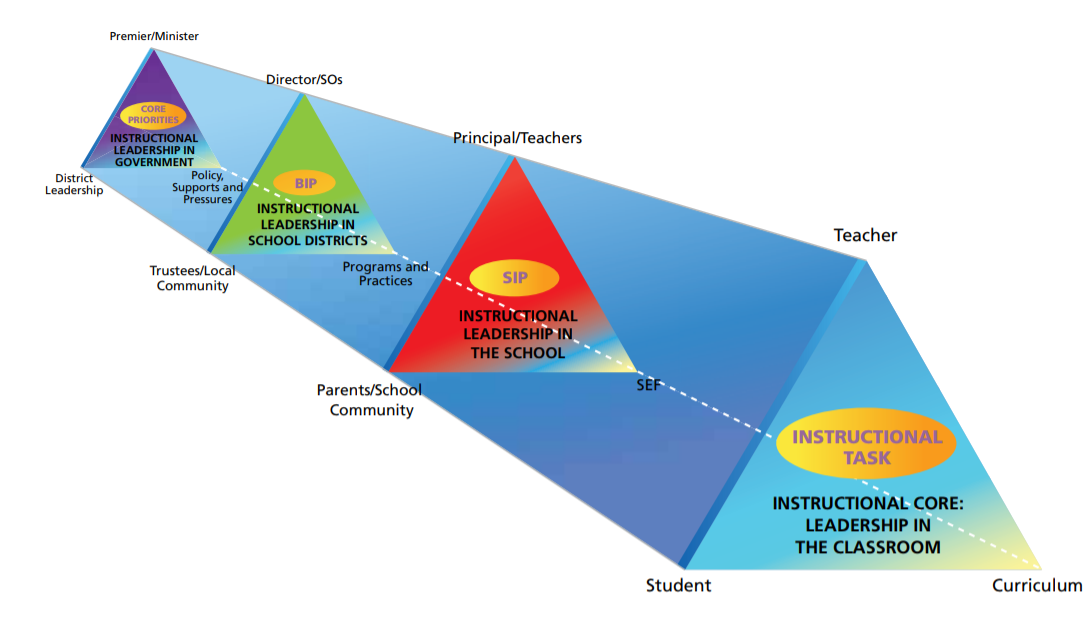| Welcome back to Flipping the Focus. As suggested by the title of today's post, ...
|
This Spring and Summer, I've had the privilege of contributing my experiences in Education as a course instructor for Intermediate and Senior Math ABQs through the University of Windsor's Centre for Teaching and Learning. And I must say that this has and continues to be a source of inspiration for my own pedagogical practice and instructional leadership. I am both thankful and grateful for my students' leadership in learning for and on behalf of one another.
Of the many discussions and assignments that students engage in, most recently students completed some background research on gap-closing in Mathematics and shared and discussed their perspectives with one another. What came out of that discussion for both students and their instructor (me) was a deepened sense of learning for all--all of it made possible by the authentic engagement of each contributor. And the discussion went well beyond working to close gaps: the conversation guided us towards planning the actions we could take to prevent gaps from being created and widened over time.
Below is a response that was shared with students as general commentary and feedback to the insights evoked from their contributions--A Letter to Students: Gap-closing in Mathematics. At this time, I'm sharing it with you for your consideration and commentary.
"Hello Everyone. What a lively discussion around why gaps occur, what to do when they do, and most importantly how to address closing them! From what I can see, as the conversation evolved, is a theme of pro-activity. Thanks so much for your contributions.
A number of keywords 'lifted' off the page for me, as I spent time thinking about your posts. Perhaps, this highlighting bears some implicit bias as per my experiences, but I hope that you don't mind me sharing. These words included the following:
LIST: diagnostic, extra support, learning styles, school/district support, SES, student engagement, novelty (interpreted), assessment (formative; interpreted), confidence & teacher efficacy (interpreted).
Interestingly, if other educators were to look upon this list without context, I'm not altogether certain that "gap-closing" would be the first response. So what does this mean? I'm going to refer back to a term/adjective that <student> has been using in some of their posts--and that term is "dynamic".
If you have a moment, perhaps you can scan the following Capacity-Building Series document on "Dynamic Learning" (2013) and see how the ideas presented there either square with your thinking, leave you wondering, and/or give you takeaways to apply to your pedagogical practice. The monograph aims to connect student learning with teacher learning--i.e., what it means to be a dynamic learner (either from the student or educator perspective). I think that you'll find it both inspiring and thought-provoking.
After I took time to scan the monograph and do some further reflection, I thought about re-grouping the terms into an overarching theme and sub-groups.
RE-GROUPING: Over-arching Theme: Student Engagement | Group 1: diagnostic, learning styles, novelty | Group 2: assessment, learning goals, backwards design | Group 3: extra support, school/district support, SES, individual & collective teacher efficacy
Essentially, our role is to help students engage in learning--learning that is relevant and meaningful, as well as learning to becoming more assessment-capable over time. This is the over-arching theme I'm proposing.
Groups 1 & 2 refer to those aspects of pedagogical practice that fall within the domain of educators and groups of educators. Group 1 aspects focus on getting to know students early on, and the term "novelty" (interpreted from one of the posts) relates to getting to know our students, as uniqueness in the experiences we cultivate are paramount to student engagement. There is a fair amount of cognitive/brain science that relates to novelty and its importance in students transferring their learning to long-term memory and/or having facility in retrieving information. For additional reading, I'd like to suggest the following:
Book: How the Brain Learns Mathematics (2015) by David A. Sousa.
If you have the opportunity to purchase (or borrow) the book and study it with colleagues (e.g., a book study with a school learning team), I think you'll find some wonderful benefits there. Chapters 5 & 6 deal with the concept of novelty and learning for both the pre-adolescent and adolescent brain. It's a great resource to have in your professional library.
Group 2 is the "heart-and-soul" or "art of teaching" that we engage in daily, and from a macro-level, we spend significant amounts of time in terms of designing assessment plans that flow from the big ideas and curriculum (call this "Point A") to students identifying what's important to their learning (these very ideas; call this "Point B"). Although simply put, there's so much that happens between these points in time and is consistently influenced by the Group 1 aspects you've brought to light. And let us not forget the importance of students being a part of co-designing the assessment process (this has also been mentioned (interpreted from) several of your comments in different posts).
Group 3 elements are primarily directed from the domain of instructional leaders--be they teacher-leaders, administrators, supervisory officers or a combination of all three. The formalized, extra support examples in our discussion were tied to also boosting parent confidence in the supports being made available to their children. Certainly in these times (and historically), it's key that we are growing public confidence in public education, as "we're all in this together"--parent engagement...not just involvement...is important to student and school success.
As per the research of Dr. Ken Leithwood, adherence to school improvement, with a predominant focus on parent confidence and engagement (what is referred to as the "Parent Path") will not effectively yield the sought improvements in student engagement and achievement, but it is one of several contributing factors. The greatest (most influential) factor upon a school's improvement is a focus on the teaching and learning that educators and their students do on a daily basis--teaching, as I identified earlier, being driven by student need. This is well-documented in the research literature (e.g., Viviane Robinson, University of Auckland) and is a key aspect of any leader's approach to school improvement.
The mechanism for these improvements lies in what we refer to as Collaborative Inquiry--i.e., investigating a shared problem of practice that relates to pedagogical practice. For example, at the elementary level, we might focus on unpacking a continuum of additive or multiplicative strategies for operating on numbers. In the secondary panel, we might focus on formative assessment practices--i.e., what the use of conversations, observations and products looks like for both teachers and their students.
These shared problems change over time, as educators, schools and systems evolve with new student and societal challenges being identified as urgent needs. The collaborative study (as done by learning teams) is also a source of increasing both individual and collective teacher confidence and efficacy towards improving student engagement and achievement.
This brings me back to the theme mentioned at the outset of my response: pro-activity. Throughout this post, I haven't been referring to and/or using the term, "gap" or "gap-closing". This is not intentional: it's a product of what you've presented along the way. This, in no way, implies that gap-closing is not going to be addressed. Veritably, there are times where we need to provide tiered supports to students to help them draw closer to the goals of the curriculum they're working towards attaining--absolutely. My point, here (as you've inspired), is that which we do in preparation for (i.e., our own learning...as determined by student need), during (based on ongoing, formative assessment), and after (reflecting upon the monitoring of students' learning and our own) working with our students over specific intervals of time can and will go a long way to help close learning gaps (i.e., for students) and achievement gaps (for groups).
As for mitigating factors--SES, parent engagement, supports from districts and other sources, etc.--we will always be working alongside these (sometimes urgently, persistently, flexibly or a mixture of all of these modes), but amazing things can be accomplished with our most challenging students when they are motivated to learn--cared for, challenged and championed by the adults in their school.
Lastly, in addition to the resources I've suggested earlier (Dynamic Learning, David Sousa, and the work of Dr. Ken Leithwood), you might find the following helpful in your journey. I've included links to make them more accessible.
-Ontario's "Achieving Excellence" document (2014)
-Learning for All (Ministry of Education, 2013)
-Focusing on the Fundamentals of Mathematics: Teacher's Guide (2018)
I hope that you've found this post helpful and that you've been as inspired by your peers' contributions as I have been. Thanks again for your contributions...so appreciated. If you have any further comments to share to this thread, and/or have additional questions/comments you'd like to share with me, please feel free to do so.
All the best, Chris."
Outside of accreditation being a source of external inspiration, what are the primary, internal drivers for a group of professional educators to generating insights towards innovation? Our purpose and intentions--to improve the conditions for both teaching and learning--are supported because our own learning involves the following drivers:
- Relevant curriculum and meaning-making supported
- Collaborative and supportive learning environments
- Relational trust links being established
- Building knowledge from places of strength and experience, as well as being research-informed
- Accountability to learning on behalf of others
- Autonomy through the group, as well as respect for individual choices, contributions, and self-pacing
- What inspires you towards being innovative in your teaching (or leadership) practice?
- How do you come by inspiration?
- And better yet, what do you do to move yourself and others FROM insight TO implementation TO staying the course?
In closing, I can't help but to think of the conversations that can be inspired when we take collective action to improving student learning. As this blog is a means for readers to network and gradually change the context for how they teach and learn, we all benefit by drawing nearer to the perspectives shared here and shared beyond with our professional learning networks.
I am more than happy to collaborate with you and make our learning visible, here. If at any time, you have questions or comments, please feel free to reach out to me at Flipping the Focus.
Sincerely,
Chris Stewart, OCT
Education Leader at Flipping the Focus


 RSS Feed
RSS Feed


